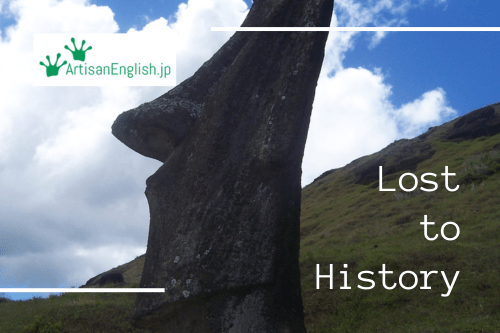
YouTube / iTunes / Spotify / Radio Public / Pocket Casts / Google Podcasts / Breaker / Overcast
Listen to ArtisanEnglish.jp posts & lesson intros here.
Phrase: Lost to history
Being lost to history can happen for various reasons.
It could be due to a lack of interest or significance at the time, or the documentation may have been destroyed or lost.
Whatever the reason may be, those who are lost to history are often overlooked and forgotten, leaving them to fade into obscurity.
The phrase lost to history refers to individuals, events, or places that have been forgotten without records or documentation.
It’s as if they never existed at all.
One example of being lost to history is the story of the first African-American woman to earn a pilot’s license, Bessie Coleman.
Despite her incredible achievement in a time when African Americans and women were not given equal opportunities, Coleman was largely ignored by the media and the public.
Her name and legacy were lost to history for many years until recent efforts to bring her story to light.
Another example is the ancient city of Petra in Jordan.
Once a thriving city and trade hub, Petra was abandoned and forgotten for centuries, with only a few Bedouin tribes knowing it existed.
It wasn’t until the 19th century that a Swiss explorer rediscovered the city, bringing it back from being lost to history.
It’s important to recognize those lost to history and try to remember and preserve their stories.
By doing so, we can honour their memory and learn from their experiences.
Without these efforts, valuable historical and cultural knowledge would be lost forever.
Being lost to history is a fate that has befallen many individuals, events, and places.
By recognizing and preserving the stories of people before they are lost to history, we can ensure that their legacies live on and that we can learn from their experiences.
Flesch-Kincaid Readability Test
This post is understandable by someone with at least a 9th-grade education (age 15).
On the Flesch-Kincaid reading-ease test, this post scores 51.
The easier a passage is to read, the higher the score on a scale of 0 – 100.

